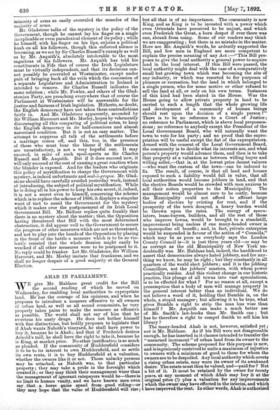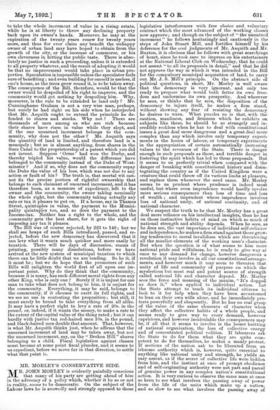AHAB IN PARLIAMENT.
WE give Mr. Haldane great credit for the Bill the second reading of which he moved on Wednesday, for enabling local authorities to expropriate land. He has the courage of his opinions, and when he proposes to introduce a measure offensive to all owners of urban land, as well as all sound economists, he very properly takes pains to make the measure as offensive as possible. The world shall not say of him that he sweetens his nasty drugs. He does not bother himself with fine distinctions, but boldly proposes to legislate that if Ahab wants Naboth's vineyard, he shall have power to buy it, because he is Ahab ; and that if Frederick desires Arnold's mill, he shall have the right to take it, because he is King, at market price. No other justificatioz is so much as pleaded. If the community of Huddersfield considers it to be to its interest to own Huddersfield, and so settle its own rents, it is to buy Huddersfield at a valuation, whether the owners like it or not. Those unlucky persons may be attached, as Naboth was, to that particular property ; they may take a pride in the foresight which created it ; or they may think their management wiser than the management of ignorant ratepayers would be—there is no limit to human vanity, and we have known men even say that a horse gains speed from good. riding—or thoy may hope that the value of Huddersfield will rise ;- but all that is of no importance. The community is now King, and as King is to be invested with a power which even Orientals have perceived to be unjust, and which even Frederick the Great, a born despot if ever there was one, shrank from using. Some of our readers may think we are exaggerating ; but there is no mistake in the matter. Here are Mr. Aiquith's words, he ardently supported the Bill, and few men in England are more competent to explain the precise meaning of any Act :—" This Bill pro- poses to give the local authority a general power to acquire land in the local interest. If this Bill were passed, the local authority might deal with the case of a comparatively small but growing town which was becoming the site of any industry, or which was resorted to for purposes of pleasure or recreation, but the land in which belonged to a single person, who for some motive or other refused to sell the land at all, or only on his own terms. Instances of this kind had been stated in the House. Was the House going to allow private property in land to be carried to such a length that the whole growing life and development of a community of human beings should rest upon the decision of a single person ?' There is to be no reference to a Court of Justice ; no reference to Parliament, which is above local preposses- sions; no reference to anybody except the President of the Local Government Board, who will naturally want the town to vote for his party ; and no proof that the expro- priation will be useful except the fiat of the expropriators. Armed with the consent of the Local Government Board, the community is to decide what its interests are, and what person's property would advance them, and then is to take that property at a valuation as between willing buyer and willing seller,—that is, at the lowest price decent valuers —who want the custom of the town—can be induced to fix. The result, of course, is that all land and houses exposed to such a liability would fall in value, that all local authorities would become jobbers in land, and that the elective Boards would be crowded with men anxious to sell their rotten properties to the Municipality. The management would be almost sure to be costly, because the Municipality could not afford to affront large bodies of electors by evicting for rent, and if the prosperity of the town decayed, a heavy burden would be thrown upon the rates. The energy of specu- lators, lease-buyers, builders, and all the rest of those who improve towns, would be brought to a standstill, improvement being useless if one many-headed owner is to monopolise all benefit; and, in fact, private enterprise would be suspended in favour of the action of "Councils," which may be as pure as everybody says the London County Council is—it is just three years old—or may be as corrupt as the old Municipality of New York un- doubtedly was. Mr. Haldane had, indeed, the hardihood to assert that democracies always hated jobbery, and for any- thing we know, he may be right ; but they constantly in all quarters of the world elect jobbers ; and it is the jobbing Councillors, not the jobbers' masters, with whom power practically resides. And this violent change in our historic practice, this plunge of all towns into vast speculations, is to be effected for what ? For no reason at all, except a presumption that a body of men will manage property in the general interest better than an individual. We do not believe a word of it, holding that Bumble is, on the whole, a stupid manager; but allowing it to be true, what gives Bumble a right to strip the man less wise than himself ? Mr. Asquith can make a much better use of Mr. Smith's law-books than Mr. Smith can • but has he therefore a right to compel Smith to sell him his library ?
The many-headed Ahab is not, however, satisfied yet ; nor is Mr. Haldane. As if his Bill were not disagreeable enough, he has inserted in it clauses intended to transfer the "unearned increment " of urban land from its owner to the community. The scheme proposed for this purpose is new, and is ingeniously contrived to unite a maximum of injustice to owners with a minimum of good to those for whom the owners are to be despoiled. Any local authority which covets a rising urban estate, may warn its owner of its awakened desire. The estate must then be valued, and—paid for ? Not a bit of it. It must be retained by the owner for twenty years, at any moment of which Ahab may buy it at the original price (!) plus a valuation for any improvements which the owner may have effected in the interim, and which have unproved the rent. In other words, Ahab is authorised to take the whole increment of value in a rising estate, while he is at liberty to throw any declining property back upon its owner's hands. Moreover, he may at the expiration of the twenty years renew for twenty years more, and thus for ever claim any benefit the unhappy owner of urban land may have hoped to obtain from the growth of the city, or the increase of commerce, or his own cleverness in hitting the public taste. There is abso- lutely no justice in such a proceeding, unless it is extended to all property whatever,.and the result of adopting it would be that no improvement would take place in urban pro- perties. Speculation is impossible unless the speculator feels sure of benefiting ; and even building for oneself is useless, if one's house, as the trees grow round it, is to be taken away. The consequence of the Bill, therefore, would be that the owner would be despoiled of his right to improve, and the community would get nothing by despoiling him. Why, moreover, is the rule to be extended to land only ? Mr. Cunninghame Graham is not a very wise man, perhaps, but surely he had right on his side when he interjected that Mr. Asquith ought to extend the principle he de- fended to shares and stocks. Why not ? There are thousands of men among us who are rich because their shares have risen in value while they slept, and if the one unearned increment belongs to the com- munity, why does not the other ? Mr. Asquith says the quantity of land is limited, and therefore land is a monopoly ; but so is almost anything, from shares in the Suez Canal to the proprietorship of a patent which you did not invent. Suppose Orme ' had won the Derby, and thereby tripled his value, would the difference have belonged to the community instead of the Duke of West- minster? And if so, why does not the community repay the Duke the value of his loss, which was not due to any action or fault of his ? The truth is, that mortal wit can- not fix the precise portion of rightful ownership that belongs to each claimant of unearned increment, and it has therefore been, as a measure of expediency, left to the owner and the community, the owner taking nominally the whole right, but the community taking actually any rate or tax it pleases to put on. If a house, say in Thames Street, quintuples in value, the payment to the Munici- pality quintuples too, and so does the payment to the Income-tax. Neither has a right to the whole, and the community gets the best share, for it gets the right of imposing any tax it pleases. The Bill was of course rejected, by 223 to 148; but we shall see heaps of such Bills introduced, passed, and re- jected, before the new democracy has discovered that it can levy what it wants much quicker and more easily by taxation. There will be days of discussion, reams of printing, possibly many dissolutions before we have arrived at the new system of municipal taxation to which there can be little doubt that we are tending. So be it, if it must be ; but we do hope that the promoters of such Bills will enlighten the world first of all upon one im- portant point. Why do they think that the community, because it is many, has such different moral rights from any other King, who is only one ? Surely if it is unjust for one man to take what does not belong to him, it is unjust for the community. Everything, it may be said, belongs to the community, if it chooses to exert its full rights, and we see no use in contesting the proposition; but still, it must surely be bound to take everything from all alike. It may have a perfect right to levy a rate of 20s. in the pound, or, indeed, if it wants the money, to make a rate to the extent of the capital value of the thing rated ; but it can hardly with justice tax red-haired men 10s. in the pound, and black-haired men double that amount. That, however, is what Mr. Asquith thinks just, when he affirms that the unearned increment of land may be taken away, but not the unearned increment, say, on the "Broken Hill" shares belonging to a child. Fiscal legislation against classes must become at some point fiscal plunder, and it seems to us expedient, before we move far in that direction, to settle what that point is.







































 Previous page
Previous page